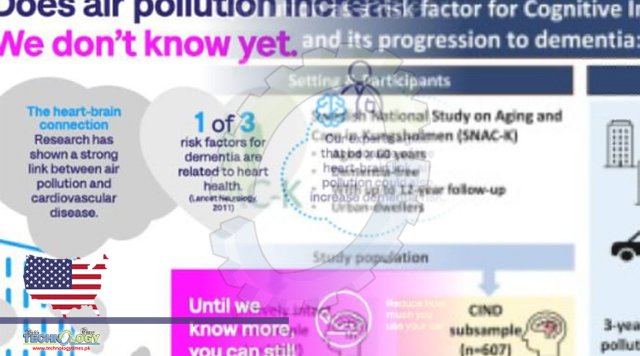A potential connection between dementia and air pollution, In the past decade, a growing body of research has shown that air pollution harms older adults’ brains, contributing to cognitive decline and dementia. What hasn’t been clear is whether improving air quality would benefit brain health.

Two studies published this year by researchers at six universities and the National Institute on Aging provide the first evidence of such benefits in an older population. One report, published in the Proceedings of the National Academy of Sciences, found that the risk of dementia declined significantly in women 74 and older following a decade-long reduction in two types of air pollution: nitrogen dioxide, a gaseous byproduct of emissions from motor vehicles, industrial sources and natural events such as wildfires; and fine particulate matter, a mix of extremely small solids and liquids arising from similar sources dementia and air pollution, .A second report in PLOS Medicine, relying on the same sample of more than 2,200 older women, found that lower levels of these pollutants were associated with a slower rate of cognitive decline. In areas where air-quality improvement was most notable, the rate of cognitive decline was delayed by up to 1.6 years, depending on the test. Both studies are national in scope and account for other factors that could affect results, such as participants’ socioeconomic status, neighborhood characteristics, preexisting medical conditions and lifestyle choices such as smoking. “
We think that when air pollution levels are reduced, the brain is better able to recover” from previous environmental insults, said Xinhui Wang, an assistant professor of research neurology at the University of Southern California’s medical school. dementia and air pollution, The hypothesis needs to be examined further in animal studies and through brain imaging, she suggested. There are several theories about how air pollution affects the brain. Extremely tiny particles — a human hair is at least 30 times as large as the largest particle — might travel from the nasal cavities to the brain via the olfactory (smelling) system, putting the brain’s immune system on high alert. Or, pollutants might lodge in the lungs, causing an inflammatory response that spreads and leads to the brain. Also, pollutants can damage the cardiovascular system, which is essential to brain health. (Links between air pollution, stroke and heart disease are well established.) Or tiny particles can cross the blood-brain barrier, wreaking direct damage. And oxidative stress may occur, releasing free radicals that damage cells and tissue. Older adults are especially vulnerable to air pollution’s harmful effects because of reduced lung capacity and pollutants’ potential to exacerbate conditions such as respiratory illnesses and heart disease. Also, air pollution’s effects accumulate over time, and the longer people live, the more risks they may encounter.
Source: This news is originally published by washingtonpost